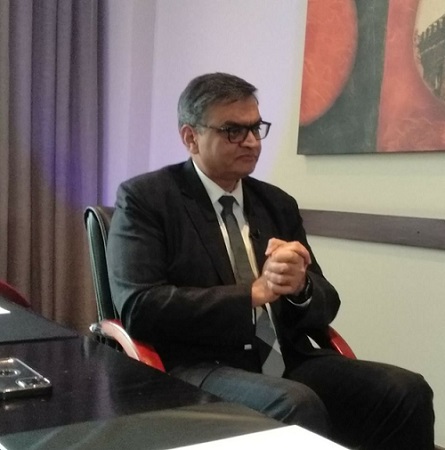Generation

ISA ink first solar framework deal in Africa

The International Solar Alliance (ISA) has signed its first country framework agreement in Africa with Ethiopia, underscoring the nation’s pivotal role in advancing solar energy solutions for agricultural and economic development.
Speaking to The Ethiopian Herald, ISA Director General Ashish Khanna said Ethiopia’s progress is central to Africa’s solar transformation. “If Ethiopia doesn’t move ahead, Africa cannot move ahead,” he remarked, highlighting the agreement signed on Wednesday that covers solar applications in agriculture, irrigation pumps, rooftop systems, mini-grids, and a 400 MW project pipeline.
Ashish described the agreement as a milestone that sets the stage for cooperation over the next five years in areas including policy, project development, and capacity building.
“We want to work with the government of Ethiopia on a solarization program for irrigation pumps and storage, which will improve agricultural productivity and create jobs,” he explained.
The initiative focuses on bringing solar energy directly to Ethiopia’s largely agriculture-based population. “Agriculture applications of solar pumps, rooftops, and mini-grids will help farmers improve both productivity and income,” Ashish said.
Drawing lessons from India’s rapid solar expansion, Ashish noted: “India now has 115 gigawatts of solar power, making it the third-largest solar producer in the world in just ten years. We are keen to bring that experience to Ethiopia to create an ecosystem that can boost incomes.”
He added that India will also share its expertise in digital solutions, competitive tendering, technical training, and farmer-centered digitization tools.
Ashish praised Ethiopia’s recent reforms, saying they have positioned the country to attract large-scale private investment in renewable energy. A country partnership strategy is expected to follow, translating the framework into detailed projects.
He further highlighted ISA’s 17 Centers of Excellence in Africa, with the first established at Addis Ababa University. These centers provide training, skills development, research, and startup incubation, while linking with India’s global capability centers for digital and artificial intelligence solutions.
“Given that the majority of Ethiopia’s population depends on agriculture, solar energy will be critical for expanding irrigation, boosting food security, and creating jobs,” Ashish stressed. He added that Ethiopia’s geographic position near the equator offers enormous untapped solar potential**, with less than one gigawatt currently developed.
“The future is bright if Ethiopia takes the right steps,” he concluded.












